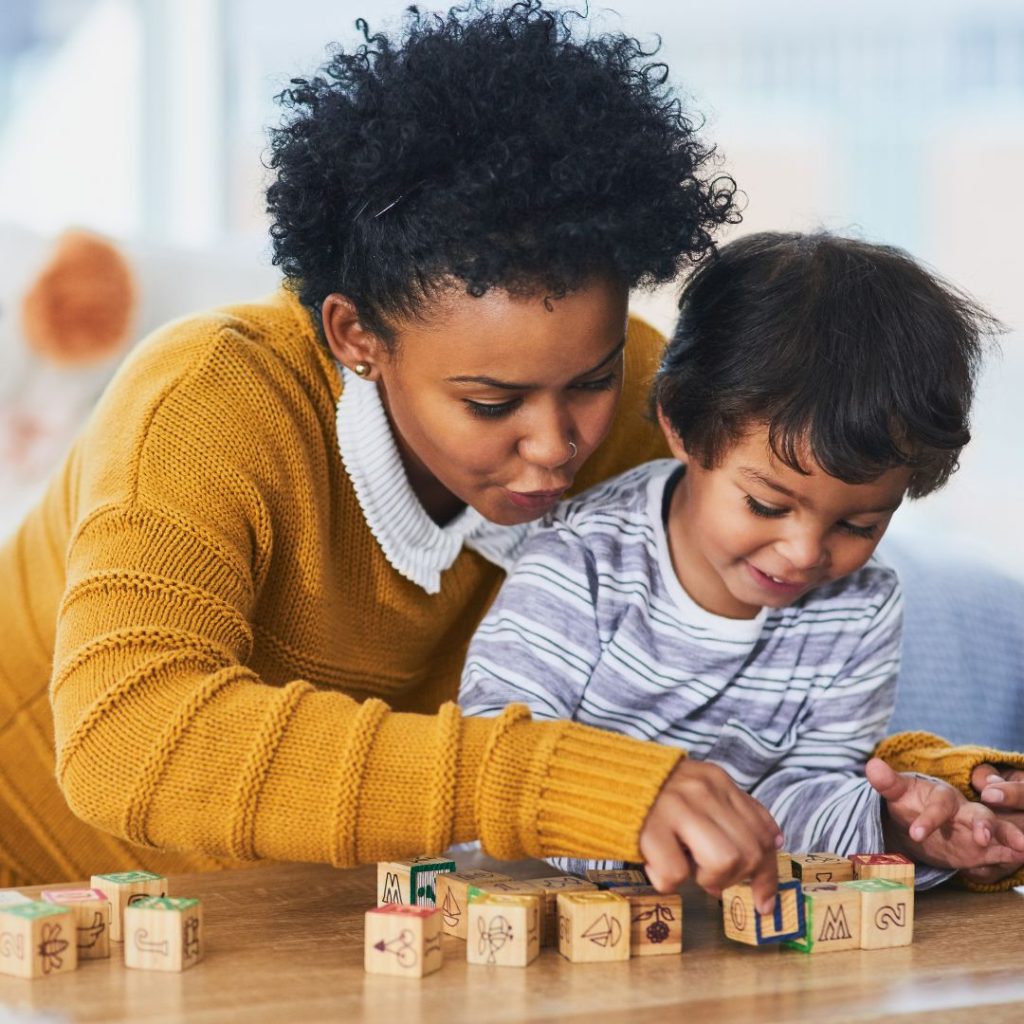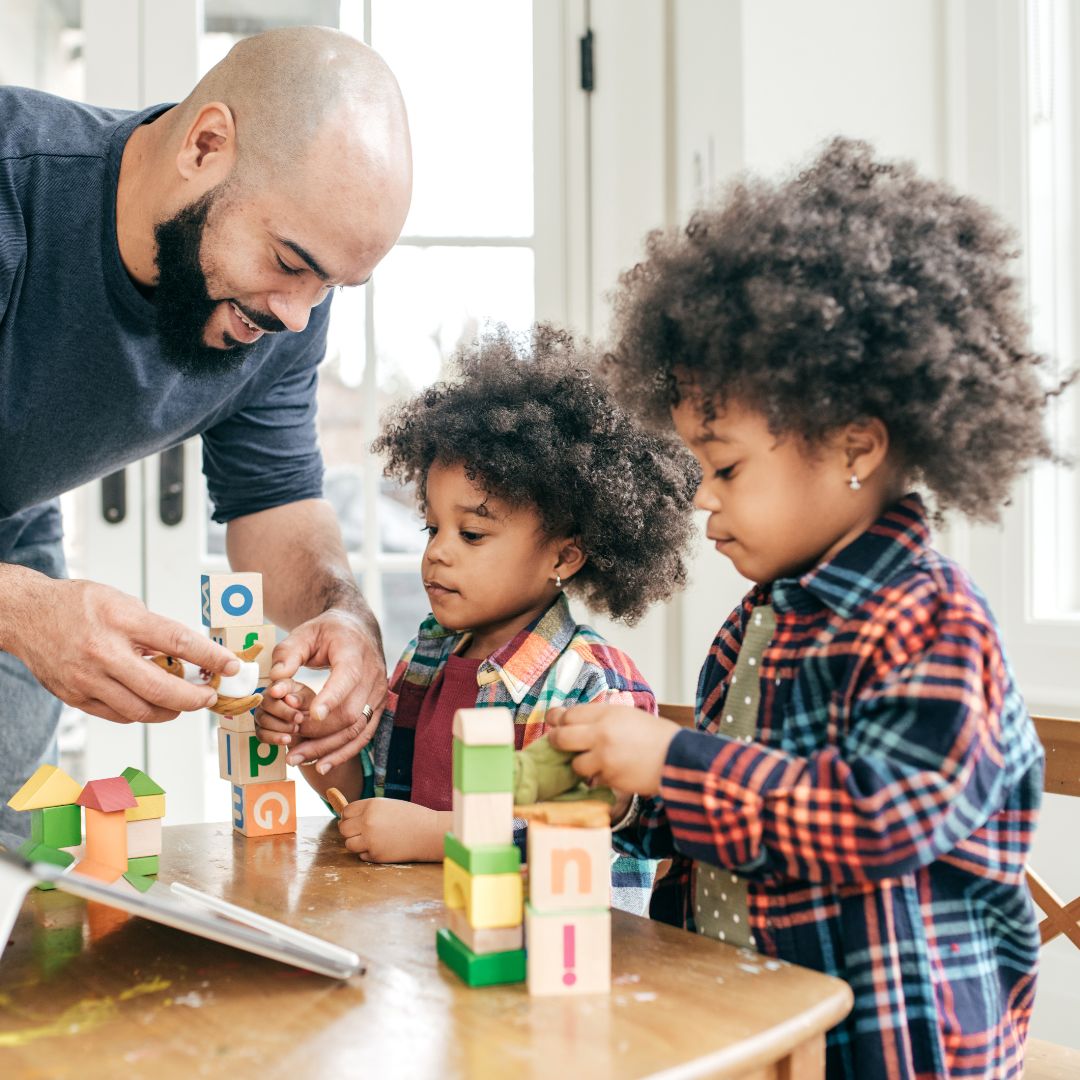Exploring the 5 Stages of Early Childhood Development
- By Stephanie Fornaro
- April 21, 2024

Parenthood is an incredible adventure, filled with moments that melt your heart—the first smile, the giggles, and the pure joy of watching your little one discover the world. Transitioning from a babbling baby to a confident kid striding off to school on their first day is a monumental rite of passage.
Astonishingly, while most parents recognize the importance of early childhood development, many remain unaware of its distinct stages. Early childhood development is a critical phase in a child’s life, shaping their physical, emotional, and cognitive development. It sets the foundation for their academic success, social relationships, and overall well-being.
In this post, we’ll uncover the magic woven into each stage of early childhood development, offering insights and guidance to help you support your precious one’s growth every step of the way.
Stage 1: Prenatal Development
Isn’t it amazing how the journey of growth and development begins even before a baby takes their first breath? The stage of prenatal development is a profound testament to the wonders of human life, setting the stage for everything that follows.
Importance of Prenatal Care
Taking care of a baby starts long before you can hold them in your arms. Prenatal care is the foundation of a healthy pregnancy, ensuring both mom and baby’s health are monitored and supported. Regular check-ups, balanced nutrition, and avoiding harmful substances contribute significantly to a baby’s development during this crucial time. We all know the link between prenatal care and positive birth outcomes, showing that women who receive early and regular prenatal care are more likely to give birth to a healthy baby. It’s not just about avoiding negative outcomes; it’s about fostering an optimal environment where the unborn child can thrive.
Critical Milestones in the Womb
Within the womb, a fascinating series of developments unfold as a baby progresses from a tiny cluster of cells to a fully formed human being. Key milestones include the heart beginning to beat around the 5th week of pregnancy, the formation of vital organs by the 12th week, and the development of senses in the latter half of pregnancy. Each of these milestones is crucial and can be influenced by the mother’s health and environment. For instance, a meta-analysis has concluded that the nutritional status of the mother can directly impact the development of the baby’s brain, emphasizing the importance of a nutrient-rich diet during pregnancy. This stage is a vivid reminder that even the smallest choices can have profound impacts on our children’s futures.
Stage 2: Infancy (0-2 years)
Ah, infancy, a stage full of firsts and fast-paced growth that never ceases to amaze. From the first time your baby grasps your finger to the magical moment they utter their first word, each milestone is a testament to the incredible developmental leaps happening right before your eyes. In this vibrant phase, every day brings a discovery, driven by crucial physical and mental health developments.
Physical Development
The physical development of a baby during the first two years is nothing short of miraculous.
1. Motor Skills
The infancy stage is characterized by rapid physical growth and the development of gross and fine motor skills. Initially, infants’ movements are reflexive, but as their nervous system matures and they gain strength, these movements become more purposeful. Around 6 months, you might notice your baby beginning to roll over or sit with support, marking the early childhood development stages of gross motor skills. By the end of their first year, many infants start to stand or even take their first shaky steps, showcasing a significant milestone in their physical growth. Studies affirm the importance of active playtime in promoting infants’ motor skills, encouraging a range of movements that lay the groundwork for future physical activities.
2. Sensory Developmental Milestones
An infant’s world is a whirlwind of new sensations, and their sensory development is pivotal in helping them make sense of it all. From the sweet scent of their parents to the colorful toys they reach for, sensory experiences are foundational for learning and interaction. Remarkably, infants are born with a sophisticated set of sensory tools. For instance, research presented in the Vision Research journal highlights the rapid development of the visual system, noting significant progress in color vision and depth perception within the first few six months of life. This sensory evolution enables infants to better understand and interact with their surroundings, forming the building blocks for cognitive development.
Cognitive Development
While your babies’ physical bodies are growing at a rapid rate, their minds are also working hard to make sense of the world. Cognitive development refers to the mental processes involved in thinking, problem-solving, and understanding information.
1. Language Acquisition
One of the most exhilarating aspects of infancy is witnessing the emergence of language. Initially, babies communicate through cries and coos, but as they grow, they start babbling, combining sounds in ways that mimic spoken language. This stage sets the stage for the first words and simple sentences. Research points to the critical role of social interaction in language acquisition, emphasizing that responsive communication with caregivers significantly expedites language development. By talking, singing, and reading to infants, parents can provide a rich linguistic environment that nurtures their burgeoning communication skills.
2. Object Permanence
Cognitive development in infancy includes understanding that objects still exist even when they’re out of sight, a concept known as object permanence. This realization typically unfolds around 8 to 12 months of age, marking a crucial milestone in cognitive growth. It underpins many aspects of cognitive development, including memory and problem-solving skills. Studies, including those discussed in the Frontiers in Psychology, have shown that games like peek-a-boo are more than just fun; they’re instrumental in teaching infants about object permanence and fostering cognitive milestones through playful interaction.
Stage 3: Early Childhood (2-6 years)
Transitioning from the wide-eyed wonder of infancy to the exploratory stage of early childhood development feels like stepping onto a whole new playground. It’s a time when imagination runs wild, friendships begin to blossom, and the world starts to look a little bigger through their eyes.
Social and Emotional Development
The social and emotional development of kids should never be overlooked, especially during early childhood development.
1. Formation of Attachments
During early childhood, children start to form more complex attachments not just with their parents, but also with peers and other adults outside the family circle. This period is crucial for developing trust and security that influence their interactions and relationships throughout life. The quality of these early attachments can impact everything from children’s future social relationships to their ability to cope with stress. A stable and loving attachment with caregivers sets the foundation for healthy emotional development and resilience.
This emphasis on the formation of stable attachments underscores why families must consider a professional nanny for long-term care, rather than settling for a revolving door of caregivers. At Hello, Nanny, we specialize in matching families with skilled, compassionate nannies who can provide the consistent presence necessary for healthy emotional development, so your kids can safely attach and thrive in a nurturing environment.
Learn More About How We Can Help Connect You With The Best Nanny For Your Family!
2. Emotional Regulation
Kids in this stage are also learning the art of emotional regulation – the ability to manage and respond to an emotional experience in an appropriate manner. This is no small feat. Parents and caregivers play a significant role in this process through modeling and guidance. Techniques like naming emotions, demonstrating appropriate ways to express feelings, and setting consistent boundaries contribute to children’s ability to regulate their emotions effectively. This skill is vital for their success in social interactions and academic settings alike.
3. Imaginative Play
Imaginative play, a vibrant theatre of the mind, serves as a fundamental tool in the growth and development of children. Encouraging this boundless creativity isn’t just about having fun; it’s about nurturing key life skills. A study in the Frontiers Science Communications journal illuminated the profound impact of imaginative play and social-fantasy toys on interpersonal skills. Children who frequently engaged in play characterized by high levels of imagination were more adept at empathizing with others, understanding diverse perspectives, and navigating social interactions smoothly.
It’s through imagination and creativity that children learn to confront and solve problems, sparking a depth of inquiry and innovation. Engaging in elaborate narratives and scenarios with the help of social fantasy toys, they become adept at finding unique solutions and considering alternative possibilities. More than simple play, it’s an exercise in cognitive flexibility and original thinking.
For example, in the spirit of nurturing this imaginative wonder, “Hold The Magic” re-imagines the traditional Tooth Fairy tale into an immersive experience. Every tooth fairy visit becomes more than just a rite of passage; it transforms into a cherished, magical moment. This tradition isn’t just about commemorating a childhood milestone; it’s about instilling a sense of awe and expanding the horizons of what’s possible, one tiny, magical gift at a time. Parents can use such experiences to foster an environment where imagination and creativity flourish, supporting children’s development in ways that are both profound and lasting.
Stage 4: Middle Childhood (6-8 years)

Ah, middle childhood—a time when school desks start becoming a daily routine and friendships become the epicenter of life’s adventures! It’s an exhilarating leap from the foundational years, propelling kids through new academic landscapes and rich social terrains.
Academic Development
Your kids’ academic development is ramping up during this stage, as they learn to put their language and cognitive skills into action.
1. Importance of Early Learning
The bell rings not just to signal the start of the school day but also to kickstart a critical phase in academic development. During these early years, the groundwork laid during early childhood development begins to show its true colors. According to numerous studies, early engagement in structured learning environments significantly enhances reading, writing, and math skills. These early academic ventures not only bolster traditional educational achievement but also foster an intrinsic love for learning, setting the stage for lifelong educational pursuits.
2. Cognitive Challenges and Achievements
Middle childhood is marked by substantial cognitive leaps, navigating through complex reasoning tasks, mastering the art of strategy, and facing academic hurdles. Children at this stage start to employ more sophisticated problem-solving strategies, echoing the shift from concrete to more abstract thinking. This cognitive shift is monumental, aiding them in navigating the complexities of mathematics, science, and literature. Successes and challenges in these domains greatly influence their academic self-concept and motivation.
Social Skills
At this stage, your child is also honing their social skills and learning how to communicate more effectively with peers and adults. It’s a time when friendships become an essential source of support, as children learn the value of cooperation and teamwork in achieving shared goals.
1. Peer Relationships
Now, turning the page to the social scene—peer relationships start taking center stage. These relationships are not just incidental; they are a playground for developing an array of social skills. Through interactions with peers, children learn the ropes of cooperation, assertiveness, and conflict resolution. These friendships are more than mere companionship; they are crucial for the social and emotional support that bolsters children’s resilience in facing school stresses and challenges.
2. Developing Empathy
Empathy, the ability to understand and share the feelings of another, begins to blossom vividly during these years. It’s a skill that’s nurtured in the rich soil of social interactions and parental guidance. Studies demonstrate how children with higher levels of empathy tend to excel in both academic and social spaces. They are the ones more likely to engage in prosocial behaviors, showing kindness and offering help to peers, which further enriches their own social experiences and relationships.
Stage 5: Late Childhood (8-12 years)
Ah, late childhood—the prelude to teendom where both body and mind undergo a whirlwind of changes. It’s as if nature decided it’s time to hit the fast-forward button, marking the onset of a complex and fascinating chapter in a child’s healthy development.
Physical Changes
From the outside, late childhood may seem like a time of little change, but the body is undergoing significant transformations.
1. Puberty
The word ‘puberty‘ echoes through the halls of late childhood like a herald announcing the forthcoming of adolescence. It is a series of orchestrated hormonal events triggering physical growth and development. This is the time when children start to notice changes in their body shape and height, a period that can be as bewildering as it is exciting. It’s a foundational stone for discussions around self-image and health choices.
2. Hormonal Influences
Hormones are the unnoticed orchestrators of these changes. These biochemical messengers play pivotal roles, not just in physical transformations but also in affecting mood and emotions. Understanding the hormonal influences helps in navigating the sometimes turbulent emotional seas of late childhood, offering insights into behaviors and mood swings that seem as unpredictable as the weather in April.
Intellectual Growth
Not to mention, this stage of early childhood development is also one of great intellectual growth, where children are building on the foundations laid in earlier stages and refining their cognitive abilities.
1. Abstract Thinking
Abstract thinking marks the beginning of a new phase of thinking, allowing children to reason logically, make inferences, and grasp abstract concepts. With these tools at their disposal, children are better equipped to understand complex mathematical and scientific principles that they will encounter in middle and high school.
2. Problem-Solving Skills
Alongside abstract thinking, problem-solving skills emerge as beacons of intellectual growth during late childhood. Children start to approach challenges with strategic thinking, learning to evaluate multiple solutions before taking action. This early childhood development is crucial, not just academically but in everyday life, laying the groundwork for resilience and adaptability in the years to come.
OrCam Learn Improves Reading and Learning Skills
Now, we’ve seen how intellectual and physical transformations set the stage for deeper learning and understanding during early childhood development. Now, imagine a tool that allows your child to take that next step forward. OrCam Learn is a powerful assistive technology tool designed to improve reading and learning skills. It harnesses the power of AI to create personalized learning experiences, catering to each child’s unique needs and abilities.
Listen to Any Text
Picture this: a child, book in hand, feeling the weight of frustration because the words just won’t click. Now, with OrCam Learn, they can breathe a sigh of relief. This device reads aloud any text it’s pointed at, transforming printed words into spoken ones, thus breaking down reading barriers. By engaging both the visual and auditory senses, children can scaffold their learning experiences, enhancing their ability to decode and comprehend complex texts.
Improve Reading Skills
OrCam Learn isn’t just about listening; it’s a catalyst for active learning and reading skill enhancement. The device encourages repeated exposure to language, promoting vocabulary expansion and improved fluency. OrCam Learn, by providing immediate access to reading material interactively, serves as a personal tutor that guides children through the maze of literacy skills, tailoring the pace to each child’s unique learning curve.
View Your Child’s Reading Improvement
For parents, witnessing their child’s progress is both rewarding and enlightening. OrCam Learn offers a tangible way to visualize this growth. Through detailed analytics, parents can track improvements in reading speed, comprehension, and overall engagement with text. Such quantifiable data is invaluable, not only for celebrating milestones but also for identifying areas needing reinforcement. By providing clear insights into a child’s reading journey, OrCam Learn fosters a collaborative effort between the child, technology, and parent, creating a supportive triangle of growth and learning.
Learn More About How OrCam Learn Can Assist Your Child’s Learning Journey
Final Thoughts
Navigating the twists and turns of child development can feel like trying to solve a Rubik’s Cube in the dark. But it’s also a beautiful journey filled with milestones, growth, and learning—for both kids and parents. Every stage brings its own set of adventures and challenges, ripe with opportunities to foster curiosity, creativity, and resilience in our little ones. And remember, you’re not going this path alone. Hello, Nanny is here to light the way, providing support, resources, and guidance to enrich your parenting experience and nurture your child’s development.
Curious to see how Hello, Nanny can make a difference in your family’s life? Let us match you with a professional nanny who can nurture your child’s early childhood development and help you create a harmonious balance in your household.
Learn More About How We Can Help Connect You With The Best Nanny For Your Family!
Please follow and like us:
You may also like…
- By Blueberry Pediatrics
- By Stephanie Fornaro
- By Stephanie Fornaro


